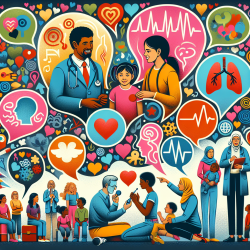Introduction
As practitioners in the field of speech-language pathology, our ultimate goal is to create positive outcomes for children. However, to achieve this, we must look beyond traditional methods and consider the broader context in which we operate. The research article "Inconvenient Human Rights" provides valuable insights into how addressing fundamental human rights can lead to better health and educational opportunities for marginalized communities, such as the Roma in Sweden.
The Research at a Glance
The article highlights the challenges faced by Roma communities in Sweden, particularly concerning access to water and sanitation. These essential services are not only basic human rights but also critical for maintaining health and well-being. The study reveals that the denial of these rights has been used as a tool to control and marginalize Roma populations, echoing discriminatory practices from the past.
Implications for Practitioners
As practitioners, we must recognize the impact of environmental and social factors on the populations we serve. By understanding the broader context of human rights, we can tailor our approaches to be more inclusive and effective. Here are some ways to integrate these insights into your practice:
- Advocate for Access: Ensure that the children you work with have access to essential services such as water and sanitation. This may involve collaborating with local authorities or community organizations to address systemic barriers.
- Educate and Empower: Educate families about their rights and empower them to advocate for better living conditions. Providing resources and support can help them navigate complex systems and access necessary services.
- Incorporate Human Rights Education: Integrate discussions about human rights into your sessions, helping children understand their rights and the importance of advocating for themselves and others.
Encouraging Further Research
The findings from "Inconvenient Human Rights" underscore the need for continued research into the intersection of human rights and health outcomes. Practitioners are encouraged to engage in or support research efforts that explore these connections further. By contributing to the body of knowledge, we can develop more effective strategies to address the needs of marginalized communities.
Conclusion
By considering the insights from "Inconvenient Human Rights," practitioners can enhance their skills and improve outcomes for the children they serve. Addressing fundamental human rights is not only a moral imperative but also a pathway to better health and educational opportunities. To read the original research paper, please follow this link: Inconvenient Human Rights.










